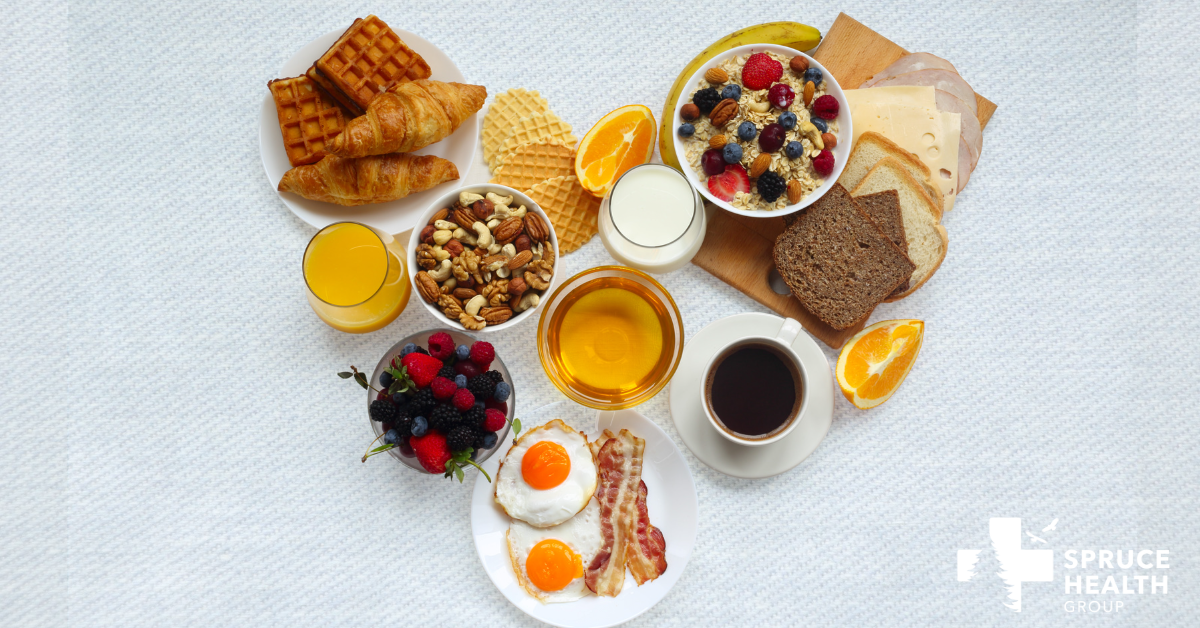Align Healthy Food as an Evolved Love Language!

Love Language of Food
Do you ever ponder how your love language really affects your loved ones? As we enjoy February, both Heart Health Month and Valentine’s Day, I want to align healthy food as an evolved love language! This is going to take some focus! Consider that I consistently eat bagels or eggs and potatoes for breakfast. Since mornings are typically a race against the clock, I got into the habit of making overnight oats when my children were young. On special occasions, however, breakfast is a cornucopia of pancakes, bacon, eggs, hash-browns, fruit, yogurt, sweet rolls, and orange juice. We call cinnamon rolls and donuts “breakfast dessert”. Yum, so good!
I mention, special occasion breakfast because those are traditions that I’ve purposely built into the fabric of my family. Hopefully, my kiddos will look back on Christmas morning or the first day of school, or a graduation celebration with warm hearts and a full belly. My husband and I rarely go out to dinner but we often go out for breakfast together. We reconnect over a robust meal replete with carbs and bacon. Breakfast is woven into the culture of my family and my marriage. Food is as universal as dance and music. Food is our love language.
Genetics and Type 2 Diabetes
Unfortunately, type 2 diabetes is also woven into the genetics of my family. My father as well as my aunts, uncles, and cousins all struggle with the disease. Risk factors for developing type 2 diabetes include advanced age, smoking, alcohol consumption, and family history. But the number one risk factor for developing the disease is excess weight. I grew up in the Midwest, where casseroles, potluck-style meals, and comfort food is very much the norm. The struggle with weight gain is beginning at a younger age. Recognizing that February is also Black History Month, I realize that friends and colleagues of different nationalities face an even steeper uphill burden than I do.
Underlying genetic components continue to be studied as diabetes becomes a rising epidemic across continents and cultures. Statistically, diabetes has disproportionately affected Native American, Hispanic, African American and Pacific Islanders. Diabetes is not simply a “sugar” problem but a disease that changes the way our cells utilize energy. Our food is broken down to glucose that is utilized as energy in the cells. Long-term, uncontrolled high blood sugar levels can result in multi-system diseases of our eyes, our kidneys, our hands and feet and our cardiovascular system.
Management of Type 2 Diabetes
For a type 2 diabetic, the body stops utilizing the glucose as energy and instead either stores it or excretes it. Currently, the best management of type 2 diabetes is with diet, exercise, medications and insulin. With each intervention, the body is attempting to “re-sensitize” the cells to utilize the glucose appropriately.
Here at Spruce Health Group, our Diabetes and Metabolic Therapy program (DMT) utilizes education, physiologic insulin re-sensitization (PIR), metabolic weight loss, and physical therapy to not only stabilize a person with diabetes but to repair damaged cells.
“DMT is a groundbreaking treatment where insulin is administered as a hormone rather than a drug; addressing the primary cause of Diabetes which is metabolic failure. By utilizing insulin in a manner that bio-mimics normal physiology, this modality is designed to reduce insulin resistance and increase cellular energy. Increasing cellular energy allows damaged tissues and organs to grow, repair, and regenerate.”5,7 Utilizing this treatment modality along with established clinical interventions, our team seeks to improve our community’s health and wellness. Because food, for all of us, is woven into our culture and our souls. It is what we share as a family, it is how we ‘break bread’ with a stranger.
Evolving Food Love Language Toward Healthy Living
But how do we align healthy food as an evolved love language? Maybe we baby step with some healthy substitutes? I found this article pretty neat to start my journey, I hope you enjoy it as well! https://www.eatthis.com/food-swaps-cut-calories/8
Food is how we connect with new friends and how we comfort ourselves in times of struggle. Universally, food is a love language. Medically, we seek to contribute to a strong, healthy and loving community so that we learn to understand our body’s response to food and how to balance our lives with our health. Do you have a favorite recipe that serves as comfort food and still promotes #HealthyLiving? Please share with us at info@sprucehealthgroup.com.
References:
- Aguayo-Mazzucato, C., Diaque, P., Hernandez, S., Rosas, S., Kostic, A., & Caballero, A. E.(2019). Understanding the growing epidemic of type 2 diabetes in the Hispanic population living in the United States. Diabetes/metabolism research and reviews, 35(2), e3097.
- Glovaci, D., Fan, W., & Wong, N. D. (2019). Epidemiology of diabetes mellitus and cardiovascular disease. Current cardiology reports, 21, 1-8.
- Lakey, J. R. (2022). Physiologic Insulin Resensitization as a Treatment Modality for Insulin Resistance Pathophysiology. International journal of molecular sciences, 23(3), 1884.
- Murphy, M. C. (2022). Beating the curve: insulin sensitization in response to exercise.
- Loveridge, B., Tucker, T., & Lewis, S. (2021). Dynamic Diabetes Solutions: Physiologic Insulin Resensitization. Int J Diabetes Metabolic Synd, 1(1), 1-5.
- Lynch, E. B., Mack, L., Avery, E., Wang, Y., Dawar, R., Richardson, D., … & Fogelfeld, L. (2019). Randomized trial of a lifestyle intervention for urban low-income African Americans with type 2 diabetes. Journal of General Internal Medicine, 34, 1174-1183.
- Spruce Health Group. (2023). Diabetes and Metabolic Therapy.
- Eatthisnotthat.com. (2023).40 Best Food Swaps That Can Double Weight Loss. Retrieved from https://www.eatthis.com/food-swaps-cut-calories/
